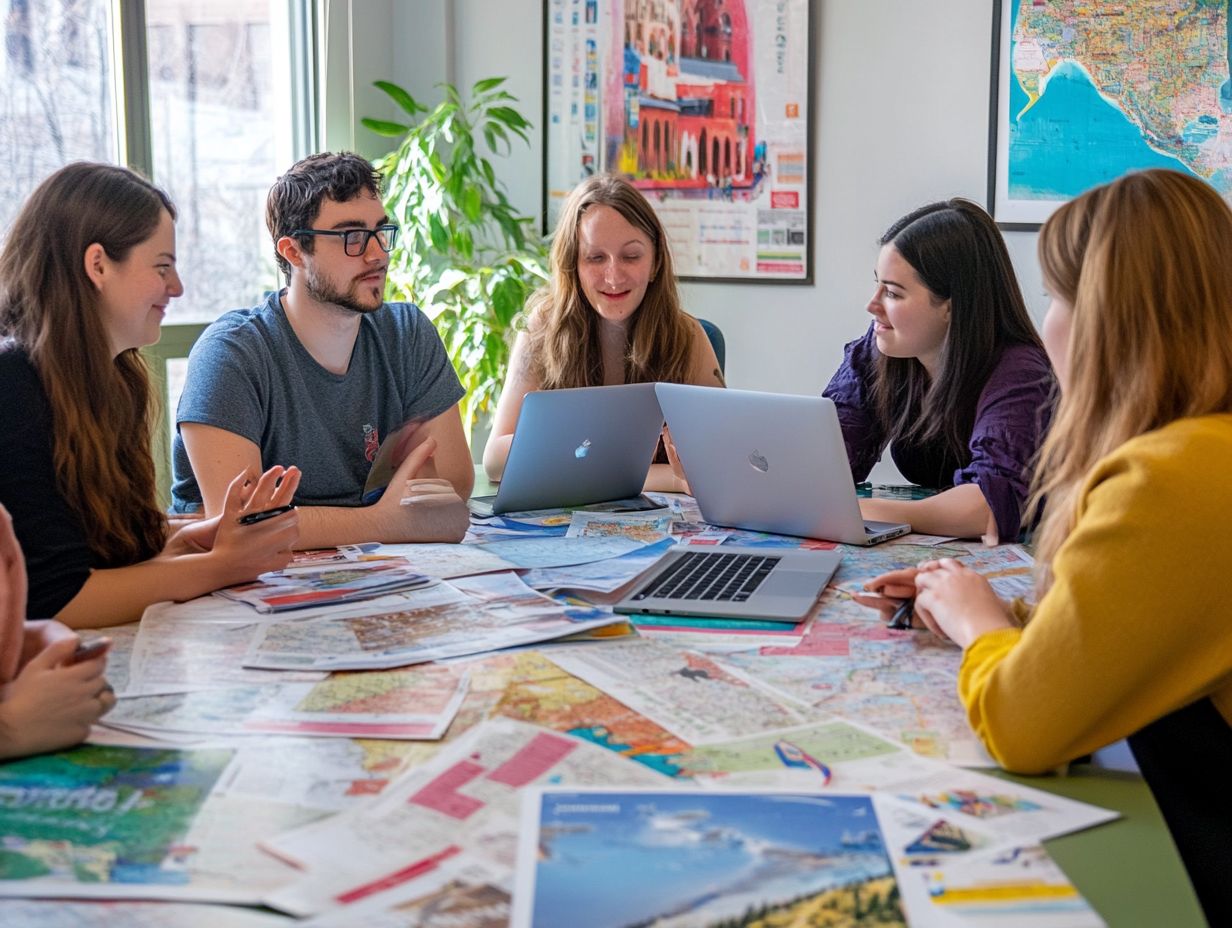How to Choose the Right Study Abroad Program?
Studying abroad offers many great benefits that profoundly enhance both your academic and personal development, aligning perfectly with your diverse academic aspirations and travel interests.
When you immerse yourself in a different culture, you not only gain unique experiences but also cultivate invaluable global networking opportunities. Engaging with international peers allows you to embrace diverse perspectives, enriching your educational landscape, while your personal travels expand your worldview.
Cultural immersion helps you understand global issues better, making you more adaptable and insightful. Ultimately, the countless advantages of studying abroad lead to a more well-rounded and enriched educational experience that you won t want to miss.
Contents
- Key Takeaways:
- Benefits of Studying Abroad
- Types of Study Abroad Programs
- Direct Enrollment Programs
- Third-Party Provider Programs
- Researching and Evaluating Programs
- Preparing for Study Abroad
- Financing Your Study Abroad Experience
- Scholarship and Grant Opportunities
- Budgeting and Cost-Saving Tips
- Frequently Asked Questions
- What factors should I consider when choosing the right study abroad program?
- How do I determine which location is best for my study abroad experience?
- What should I look for in the academic offerings of a study abroad program?
- How important is cultural immersion in a study abroad program?
- Is program length a significant factor to consider?
- How can I determine if a study abroad program is within my budget?
Key Takeaways:

- Consider your academic goals, personal preferences, and financial resources.
- Research programs based on location, cost, academics, and cultural opportunities.
- Prepare by obtaining necessary documents, learning about the culture, and finding financial support.
Benefits of Studying Abroad
When you re planning to study abroad, there are several crucial factors to consider to ensure your chosen program aligns with your academic goals and personal travel interests.
One essential aspect is determining your budget; costs can vary significantly depending on the destination. For instance, a program in India might come with more affordable tuition compared to options in the United States or Australia, which typically command higher fees.
Along with budget considerations, you should evaluate various program options. Universities in Spain may offer language classes that help you practice speaking or cultural studies that could greatly enhance your educational experience.
It s also important to understand the program features, such as internship opportunities or hands-on learning. Programs in countries like Australia often include unique fieldwork that enriches your academic and cultural knowledge, making the experience even more rewarding.
Types of Study Abroad Programs
Navigating the landscape of study abroad options can feel like a labyrinth, with a multitude of programs at your fingertips, each presenting its own distinctive features and benefits meticulously crafted to meet your specific needs.
Exchange Programs
Exchange programs present a unique opportunity for you to immerse yourself in another country s culture while advancing your academic journey.
These initiatives allow you to study abroad for either a semester or an entire academic year, giving you the chance to live alongside local peers, navigate daily life, and engage in community activities.
For example, if you re a student from the United States participating in a program in the United Kingdom, you might explore historical sites, attend vibrant British cultural festivals, and forge friendships with locals, all while taking courses at a prestigious institution.
If you choose to venture to Canada, you ll benefit from its multicultural environment, gaining insights into diverse cultures that broaden your global perspective. Through these enriching experiences, you not only expand your academic horizons but also cultivate valuable life skills that will set you apart in a competitive job market.
Direct Enrollment Programs

Direct enrollment programs allow you to attend a foreign institution as a regular student. This experience fosters a deeper integration into the local academic environment.
This approach cultivates a richer understanding of diverse cultures and immerses you in innovative teaching methodologies. Engaging with local peers and faculty provides you with unique perspectives that can truly enrich your academic journey.
These programs align with your individual academic goals and often feature courses tailored to your specific interests, making it easy to fit them into your degree requirements through effective credit acceptance.
With added features like language support, mentorship opportunities, and cultural workshops, your study abroad experience transforms into a well-rounded educational adventure that goes beyond traditional classroom learning.
Third-Party Provider Programs
Third-party provider programs present you with a remarkable opportunity to study abroad, backed by organizations that carefully manage every aspect of the experience. This often makes it a more structured choice.
These programs typically offer a variety of financial aid options, easing the financial burden for those eager to immerse themselves in international education. You may find scholarship opportunities available to help offset costs while enjoying unique cultural experiences. Unlike university-specific programs, third-party options often provide greater flexibility regarding location and curriculum, catering to a wide array of student interests.
Notable providers such as CIEE and IFSA have crafted esteemed programs that highlight vibrant local cultures and foster immersive learning environments. Their commitment to student support ensures you can focus on your studies and enjoy your time abroad with confidence.
Researching and Evaluating Programs
Dive deep into research to find the perfect program for you! Conducting thorough research and evaluating study abroad programs are essential steps in selecting the option that best aligns with your academic aspirations and personal preferences.
This thoughtful approach ensures that your choice not only enhances your educational experience but also complements your individual journey.
Factors to Consider
When evaluating potential study abroad programs, several factors deserve your careful consideration to ensure they align with your academic goals and financial constraints.
- Explore program features, such as the availability of coursework that complements your major.
- Consider the support systems in place, including academic advising and language assistance.
- Determine a suitable budget, accounting for tuition, accommodation, and living expenses.
Cultural immersion is another key element, offering you the chance to connect with local communities and engage in enriching experiences. Carving out time for independent exploration enhances your journey, allowing you to uncover unique aspects of your host country while reinforcing your educational objectives.
Questions to Ask the Program Provider
When you’re evaluating study abroad programs, asking the right questions of the program provider can profoundly impact your decision-making journey, especially when you know how to evaluate your study abroad options.
This dialogue not only aids in gathering crucial information but also fosters a deeper understanding of how the program aligns with your academic ambitions. Consider inquiring about the variety of program options available to ensure they complement your area of study.
Questions about financial aid opportunities can unveil ways to ease costs, making the experience more accessible. Cultural immersion experiences are equally vital; ask about local partnerships or community engagement opportunities to enrich your study abroad adventure.
Ultimately, each question should reflect your personal goals and aspirations. Start your adventure today by asking the right questions!
Preparing for Study Abroad

Preparing for your study abroad experience entails several essential steps. Gather all your important documents and ensure you’re culturally and linguistically ready for your destination.
These steps will prepare you for an amazing adventure!
Important Documents and Paperwork
Before you embark on your study abroad journey, it s essential to ensure that all your documents are carefully organized to avoid complications.
This includes securing vital documents like your passport, visa, and health insurance policy. Understanding the local regulations is equally crucial; host nations often have specific requirements for international students, such as evidence that you can support yourself financially or enrollment status.
Being aware of these particulars can save you valuable time and alleviate unnecessary stress. This allows you to focus on your studies and fully embrace new experiences.
Thorough preparation not only brings peace of mind but also lays the foundation for a successful academic adventure.
Cultural and Language Preparation
Cultural and language preparation is essential for crafting a successful study abroad experience, allowing you to adapt and thrive in new environments.
Understanding the customs and traditions of your host country can significantly enhance your interactions with locals. Dive into research through travel blogs, cultural documentaries, and online forums to gain insights into social norms.
Enrolling in language courses or participating in exchange programs can elevate your ability to communicate effectively. These strategies build confidence and enrich your overall experience by fostering meaningful connections and minimizing cultural misunderstandings.
Financing Your Study Abroad Experience
Financing your study abroad journey calls for careful planning and awareness of the various scholarship opportunities and financial aid options available.
Scholarship and Grant Opportunities
Scholarships and grants can significantly alleviate the financial burden of studying abroad. They make it much more attainable for you to pursue your academic ambitions.
These financial aids come in various forms, including merit-based scholarships and need-based grants. As you explore your options, conduct thorough research tailored to your desired destination.
Different countries and institutions often have unique funding schemes; some nations offer government-sponsored initiatives specifically designed for international students.
To enhance your chances of securing a scholarship, prepare your documentation carefully, maintain a strong academic record, and craft a compelling personal statement that showcases your aspirations and achievements.
Networking with previous scholarship recipients can provide invaluable insights and tips about the application process.
Don t wait start gathering your documents today!
Budgeting and Cost-Saving Tips

Effective budgeting is essential for your study abroad experience. It helps you maximize opportunities without overspending.
Start by tracking your daily expenses using apps or a simple spreadsheet. This can reveal where your money goes and help you save more!
Look for affordable accommodation options, like hostels or student housing, to reduce living costs. Using local transportation, like buses or bicycles, can save you money while you explore.
Set clear financial goals early on. This helps you make informed decisions and enjoy studying abroad without financial stress.
Frequently Asked Questions
What factors should I consider when choosing the right study abroad program?
When choosing a study abroad program, it is important to consider factors such as location, academic offerings, cultural immersion opportunities, program length, and cost. Additionally, exploring the pros and cons of different study abroad programs can help you think about your personal goals and preferences to narrow down your options.
How do I determine which location is best for my study abroad experience?
Think about the type of experience you want to have. Do you prefer a big city or a smaller town? Do you want to improve your language skills or learn about a specific culture? Consider the climate, local customs, and cost of living in each potential location.
What should I look for in the academic offerings of a study abroad program?
Ensure the program offers courses that align with your academic goals and requirements. Look at the quality of the courses, the reputation of the institution, and the opportunity for hands-on learning or internships in your field of study.
How important is cultural immersion in a study abroad program?
Cultural immersion, which involves fully engaging with and understanding the culture of your host country, is crucial. Look for programs that offer homestays, cultural activities, and opportunities to interact with locals.
Is program length a significant factor to consider?
The length of a study abroad program can vary greatly, so it is important to consider how much time you are willing to commit. Short-term programs offer a taste of cultural immersion, while longer programs allow for a deeper understanding of the host country.
How can I determine if a study abroad program is within my budget?
Before applying to a study abroad program, carefully consider the program cost, including tuition, housing, transportation, and other expenses. Research scholarships and financial aid options, and make a budget to determine if the program is feasible for your financial situation.



